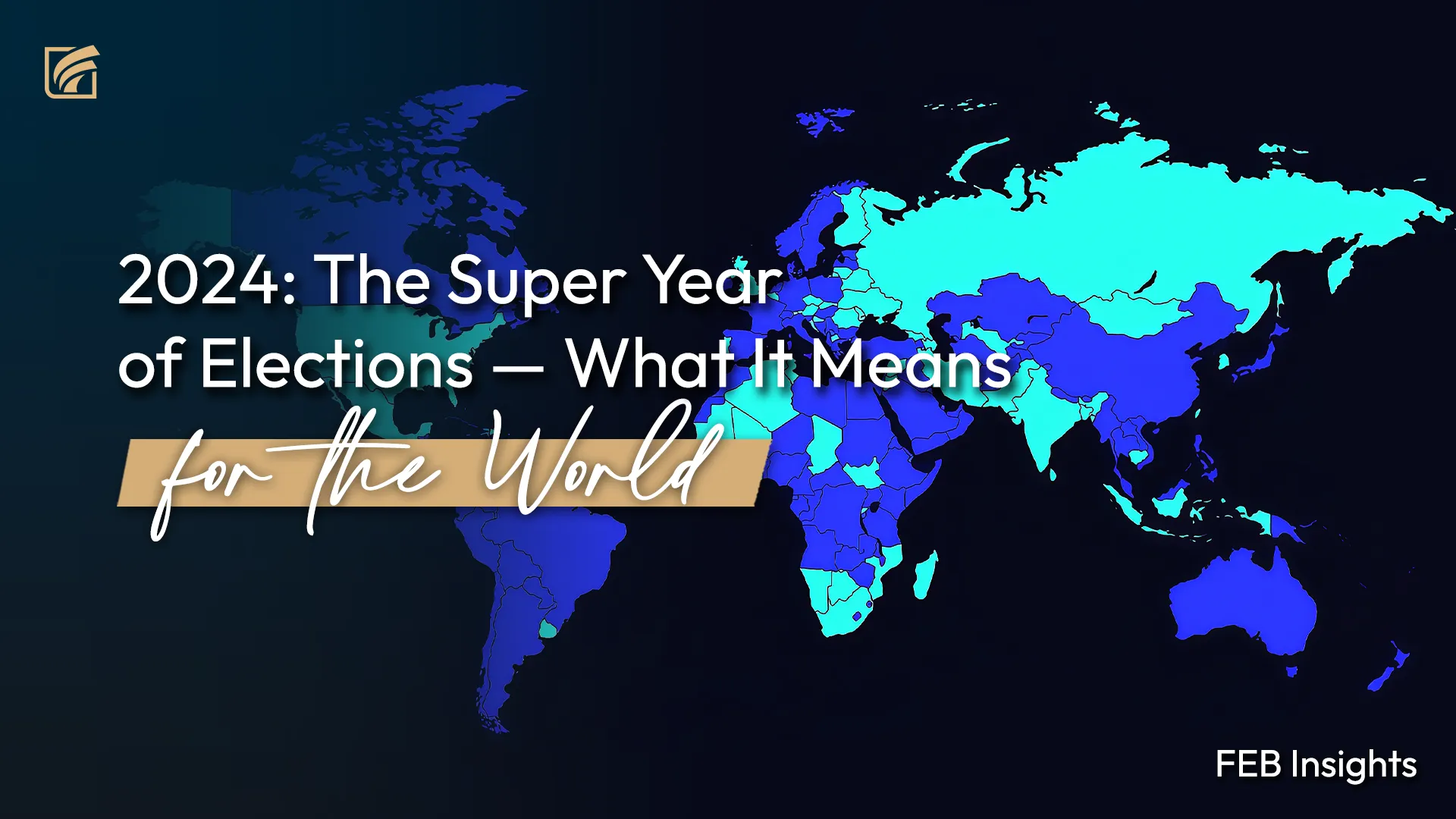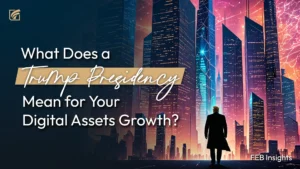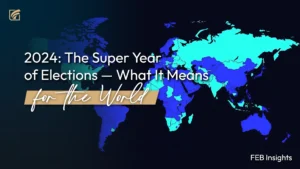2024 stands out as a year of unparalleled political activity, with over 70 countries holding elections and affecting nearly half of the world’s population, accounting for roughly two billion eligible voters. Dubbed a “Super Year” for global elections, from world superpowers to emerging democracies, this electoral cycle has a broad geopolitical significance covering nations in Asia such as Taiwan, Indonesia, India and South Korea; Africa, including South Africa, Nigeria, and Algeria; Europe; and the United States. The impact of these elections is poised to reshape global governance, trade, and diplomatic relations, creating a critical moment for both economic and political shifts on a global scale.
A Timeline overview of some notable elections taking place in 2024:
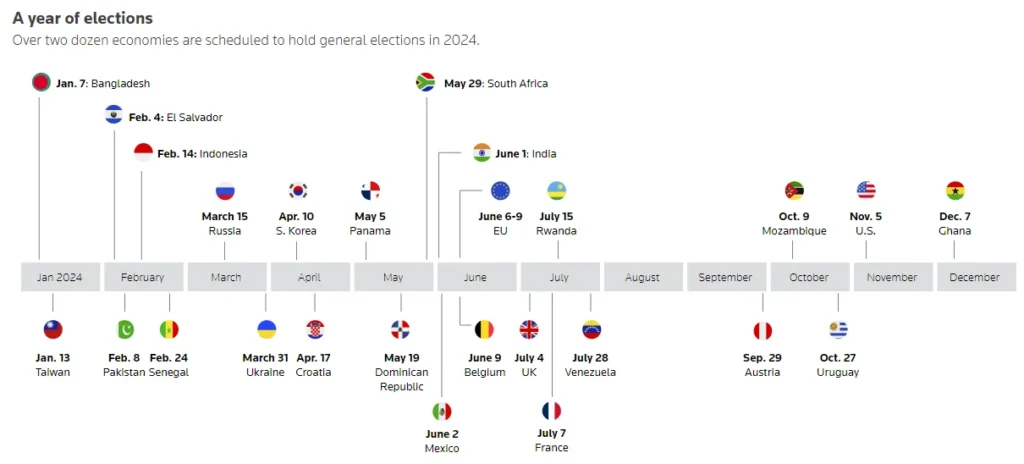
Source: Reuters
Elections Already Shaping the Year
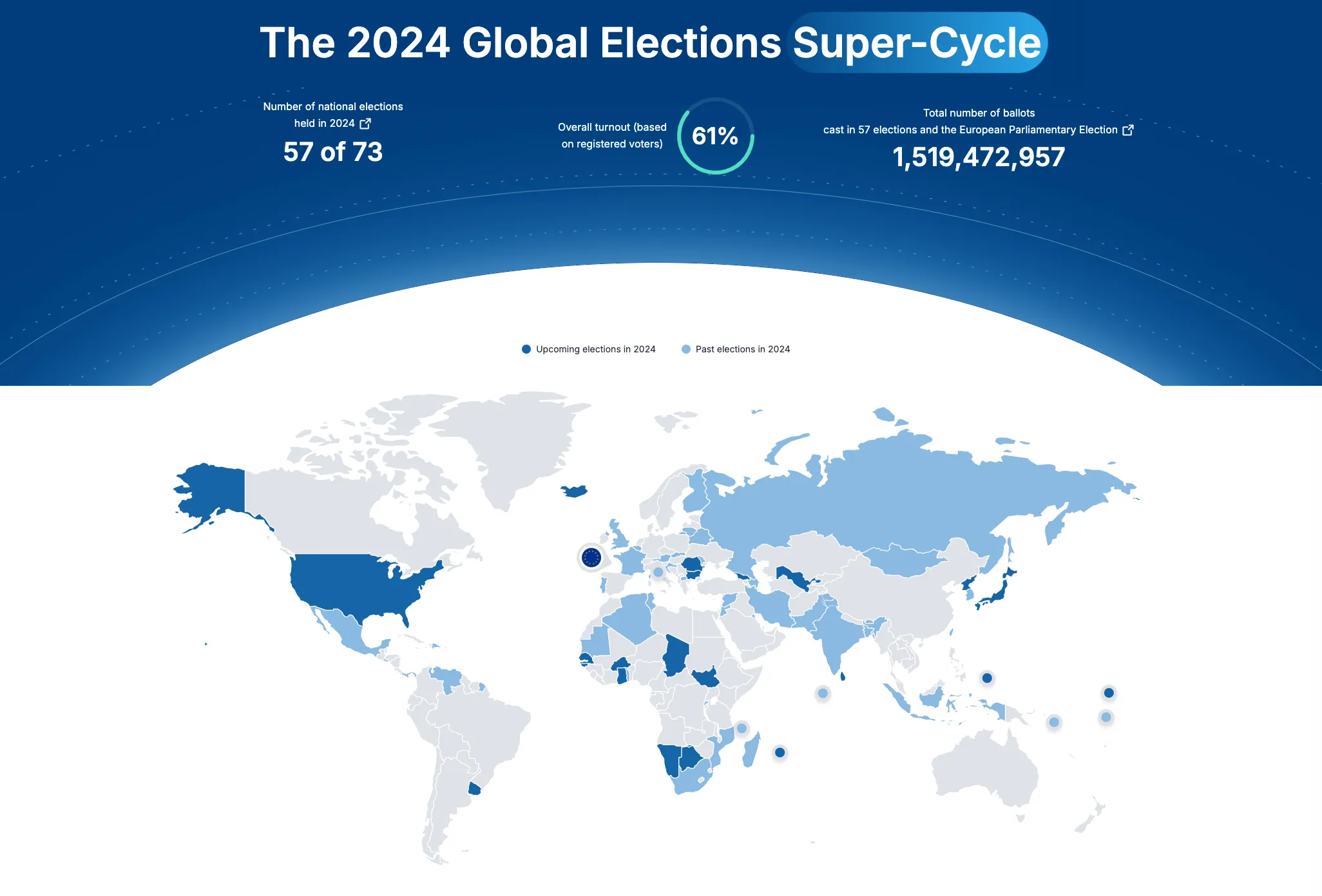
Source: International IDEA
According to statistic from International IDEA, the total number of ballots casted in 57 elections and the European Parlimentary Election is more than 1.5 billion to-date in 2024.
Several high-stakes elections have concluded, marking significant global shifts:
- – Taiwan’s Presidential and Legislative Elections (January 13): Highly anticipated due to their geopolitical significance, these elections were seen as a referendum on Taiwan’s approach to China. The results have profound implications for regional security and global trade, especially given Taiwan’s critical role in the semiconductor industry. The elections highlighted Taiwan’s strategic importance in East Asia and its relationships with key international stakeholders like the U.S. and Japan.
- – Indonesia’s General Election (February 14): Indonesia’s presidential and legislative elections were crucial in determining the country’s political and economic direction. The outcome has significant implications for Southeast Asia’s largest economy, particularly regarding its influence in regional trade and its strategic role in global supply chains.
- – South Africa’s National Assembly Election (May 29): This election shaped the political landscape of South Africa, with key focuses on economic recovery, social inequality, and corruption. The results will guide policy on tackling unemployment and inflation, which have been pressing concerns for voters.
- – India’s General Election (June): The world’s largest democracy saw massive voter turnout. The results are expected to guide India’s governance over the next five years, with implications for its economic policies and growing influence in global trade. As a central player in the Indo-Pacific region, India’s political leadership will likely impact its foreign policy and partnerships, further shaping its role on the international stage.
- – European Union Parliament Elections (June 6–9): These elections were pivotal in determining the future direction of the EU. Voters across member states showed a strong preference for progressive and green parties, resulting in a substantial shift in the Parliament’s composition. This shift underscores the growing prioritization of sustainability, climate action, and digital regulation within EU policies. The increased representation of green parties is expected to accelerate the EU’s ambitious climate goals and influence economic reforms aimed at fostering a digital and sustainable economy.
- – Sri Lanka’s Presidential Election (September 21): Focused heavily on economic recovery, the election influenced the country’s future political and financial stability. The newly elected administration is expected to implement significant economic reforms aimed at addressing inflation and reducing poverty, which have been critical issues for voters.
- – Poland’s Parliamentary Election (October 15): A notable political shift occurred as opposition parties gained ground, signaling potential changes in the country’s stance on EU relations and domestic reforms. The election results indicate a possible move towards more progressive policies and a reevaluation of Poland’s current alliances within the EU framework.
Global Focus on the U.S. Presidential Election
As the U.S. prepares for its November presidential election, the stakes extend far beyond its borders. With Vice President Kamala Harris stepping in as the Democratic nominee following President Joe Biden’s decision not to seek re-election, and Donald Trump leading the Republican race, international attention is sharply focused on the potential outcomes. This election is expected to have significant implications for global trade policies, technology regulation, and diplomatic relationships, particularly with major partners like China and Mexico.
The U.S. election could reshape longstanding economic frameworks, with investors closely monitoring its potential impact on tariffs, energy policies, and regulatory frameworks. A shift in U.S. policy on these fronts may reverberate through global supply chains, influencing markets and innovation ecosystems. The world’s economic landscape remains highly sensitive to developments in U.S. fiscal and monetary strategies, as the outcome will likely dictate the direction of key bilateral relationships and international agreements.
Election Jitters: How Political Shifts Drive Market Moves
Global markets have faced significant volatility in 2024, as political transitions and economic conditions have shaped investor sentiment. Bitcoin, in particular, has surged in recent weeks, reaching $67,493 on October 21, 2024, reflecting a 6.4% increase over the month. This rise is attributed in part to investor hedging against market uncertainties, including the upcoming U.S. election. Bitcoin’s rally has been accompanied by increased market activity, with open interest nearing an all-time high of $39 billion, signaling heightened engagement in futures markets.
Gold has also performed strongly, with prices rising to $2,681 per ounce in mid-October, as investors seek the safety of traditional assets during times of uncertainty. Both Bitcoin and gold have benefited from their status as alternative investments amid broader market unease, especially in light of potential shifts in U.S. fiscal policies post-election.
While political events have influenced investor behavior, traditional factors such as interest rates, inflation, and monetary policy remain central to market forecasts. The outcome of the U.S. election, along with ongoing geopolitical concerns, will likely continue to drive market dynamics as 2024 progresses.
Key Themes Shaping 2024’s Global Landscape
- 1. Geopolitical Realignments: As elections usher in new political leadership across several regions, longstanding alliances and trade agreements are under reassessment. In regions like Eastern Europe and East Asia, where geopolitical tensions are already heightened, these elections could significantly impact the balance of power. Changes in leadership are expected to influence both regional security and global economic partnerships, particularly in response to escalating tensions involving Russia, Ukraine, and China’s positioning in East Asia.
- 2. Sustainability and Climate Action: The push for stronger climate policies has emerged as a defining theme in European elections. Voters have increasingly backed green and progressive parties, accelerating the EU’s climate action agenda. The newly configured EU Parliament is set to implement more aggressive sustainability initiatives, which will likely pressure businesses to adopt greener practices and comply with stricter environmental regulations. This shift reflects a broader global trend of prioritizing climate resilience, with major economies like Germany and France leading the charge on green energy transitions.
- 3. Economic Recovery and Social Equality: As countries navigate the post-pandemic economic landscape, addressing inequality has become a key electoral issue. Many Latin American nations have seen election platforms emphasizing social reforms, income redistribution, and economic rebalancing to tackle persistent inequality. In regions like South America, where inflation and poverty have surged, the political focus is increasingly shifting toward policies aimed at reducing the wealth gap, boosting economic growth, and enhancing social welfare systems.
Global Implications and Looking Forward
With elections shaping the political landscape across major regions in 2024, the outcomes are already transforming governance, international relations, and economic strategies. From new leadership in influential democracies to the growing emphasis on sustainability and social equality, these results are poised to drive significant shifts in global policy directions.
For businesses, investors, and policymakers, this period highlights the need for agility. Changing political dynamics will likely impact trade agreements, regulatory frameworks, and alliances, especially in regions facing geopolitical tensions. In particular, the push for aggressive climate action, driven by elections in Europe and other regions, will spur a faster transition toward greener economies, requiring industries to innovate and align with stricter sustainability standards.
Meanwhile, the focus on economic recovery and reducing inequality, as seen in Latin America and other regions, signals potential shifts in global supply chains, labor markets, and investment priorities. Countries navigating these post-pandemic challenges will redefine social and economic policies, influencing international trade and investment flows.
Ultimately, the election outcomes of 2024 will have far-reaching effects on global policies related to climate, trade, and social equity. As governments recalibrate their strategies, the world must brace for new power dynamics, policy shifts, and economic realities that will shape the future of international relations and global growth.
Disclaimer:
The content provided in this article is for informational purposes only and does not constitute financial, legal, or investment advice. The insights shared are based on current information and analysis, and they do not necessarily reflect the official stance of the institution on these matters. Readers are encouraged to conduct their own research and consult with a professional advisor before making any financial decisions.

